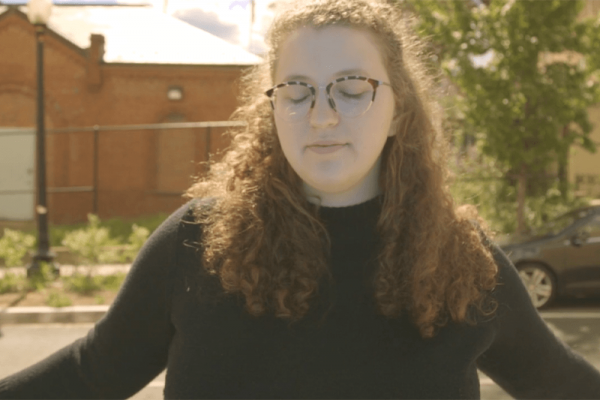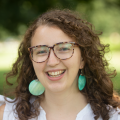I wrote the poem “I don’t want to be in my body no more” for myself. I needed to come to terms with what my body is experiencing. If I’m being honest, I still haven’t fully accepted it. The years of disbelief from medical professionals have shifted the way I see myself.
“There is nothing wrong with you. You’re fine.” I heard those eight words over and over again from doctors, lab technicians, nurse practitioners; I even had a couple of chiropractors tell me that I was just tense from hunching over my computer or carrying too many books. I have been told that the pain I feel is caused by stress, that the extreme dizziness and migraines are simply vertigo or dehydration. I have been told that my memory issues stem from exhaustion. I have been told that my excruciating, full-body pain during sex is normal because I’m young and inexperienced. I have been told that I may be infertile, and the pain and trauma I carry surrounding that possibility has been swept entirely under the rug. I have been told, I have been told, I have been told.
Rarely have I been heard.
A scientific study confirmed the existence of fibromyalgia as a medical condition in 1981. Nearly four decades later, there is still a gaping hole of knowledge in the medical community. A common mistake in diagnosing patients with invisible illnesses is treating symptoms as individual issues rather than seeing how they fit together. A combination of symptom-specific treatments and misdiagnoses made my journey to a diagnosis of fibromyalgia last over a decade. This is a common story for people with chronic and invisible illnesses. My story began at a very young age.
It started when I was seven, when my mom was in an almost fatal car accident, and through that hospitalization found out she had Hepatitis C. Truthfully, I don’t have a lot of memories of that part of my childhood, except that illness seemed to be unending. My physical issues were minor. I didn’t know any differently, so I assumed that everyone felt the same pain in their bodies that I did in mine: aches behind the knees and pain that spread from the neck down across my back. Even though my symptoms worsened as I aged, it seemed I wasn’t actually sick because there were no visible signs of sickness. I started relying on the consistency of misdiagnosis, if only for the temporary relief.
When I was 16, anxiety and depression struck hard. This was smoothed over as typical “teenage girl behavior,” a phase that would subside. But it got much worse, and in college I was diagnosed with generalized anxiety and depression. I fought hard for access to resources from my school but was denied over and over. Even with a legitimate diagnosis, the institution invalidated my health needs. A year (and many doctors) later, when I was officially diagnosed with fibromyalgia, I finally received the resources I needed.
As I felt more limited in my abilities, God became more limited. I felt confused and betrayed, abandoned even. Why me? Why now? Did I do something wrong? I reached a point of total urgency; I felt so separate from God. Living with an invisible illness is very isolating. There is overwhelming doubt from almost everyone in your life, including yourself. I started to feel ashamed of my body and mind, frustrated that I wasn’t functioning “normally.”
I used to chant the old adage, “God doesn’t give you more than you can handle,” thinking that I was weak because I couldn’t manage this all on my own. But God is so much bigger now. I don’t believe that disease and disorder are of the Lord. This was not our Mother God’s intention. Although she did not place these burdens onto us, she is with us through it all, helping us shoulder the weight. Jesus said, “Come to me, all you that are weary and are carrying heavy burdens, and I will give you rest. Take my yoke upon you, and learn from me; for I am gentle and humble in heart, and you will find rest for your souls. For my yoke is easy, and my burden is light” (Matthew 11:28-30). God did not choose for me a life of pain and doubt, but there is so much hope here: I don’t have to live alone and in fear.
Writing poetry has helped me face all the fear and uncertainty that surrounds a lifelong diagnosis. There is still fear and uncertainty, but now I can identify it by name. My hope is that others who are experiencing chronic and invisible illness can find solidarity through our shared experiences. If you are struggling, I hope that you can find comfort in the knowledge that I stand with you, I see you, and I hear you.
I don’t want to be in my body no more
I don’t want to be in my body no more
because it sure doesn’t want me
A big bloated belly stuck behind blue jeans
hollow and heavy, and my arms hanging long
Even my bones trying to break free
Ribs, brittle and bruised, sneaking out past my spine
Rocks rolling, gravel traveling up from my hips
cries shushed by my own lips
“Quiet, or they’ll hear you”
When I move my joints crackle and creak
and I stretch my chest so I can breathe
My heart is wild, sporadic, fleeting
and it hurts
I hurt
So I don’t want to be in the skin I’m in
Loosely fit and thinly spread
thoughts laid thick in my head and my eyes glazed
Most days
just around noon, when my lungs are full up of icy air
I can see where I should be
I should walk faster on graceful feet with
knees free of unseen aches
and silent legs
I should have elbows that can cradle a daughter
My daughter
My child
I should have steel shoulders
I should shoulder her pain
without her holding mine
I can’t remember
There are words left on my tongue, I can still taste them
but there is nothing
Nothing left to describe
to delight
to determine
But there is fear
Fear, oozing in like summer honey
fear of self, fear of action
of feeling
of being
of being known
So
I don’t want to be in my body no more
because it sure doesn’t want me
Got something to say about what you're reading? We value your feedback!






